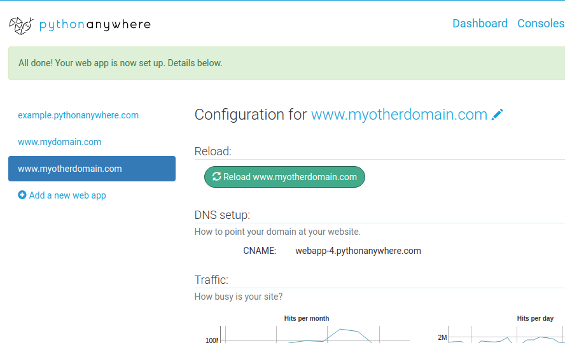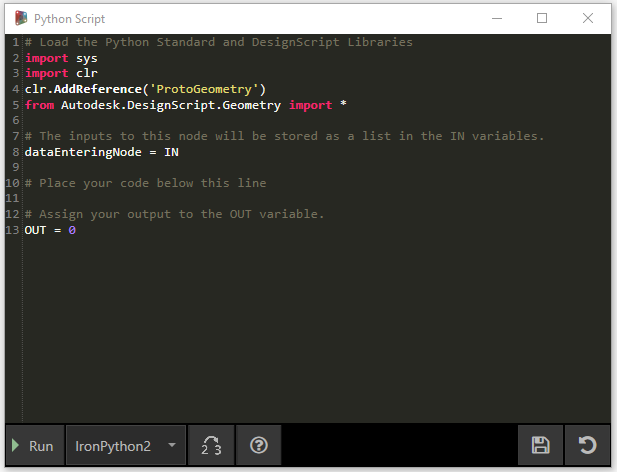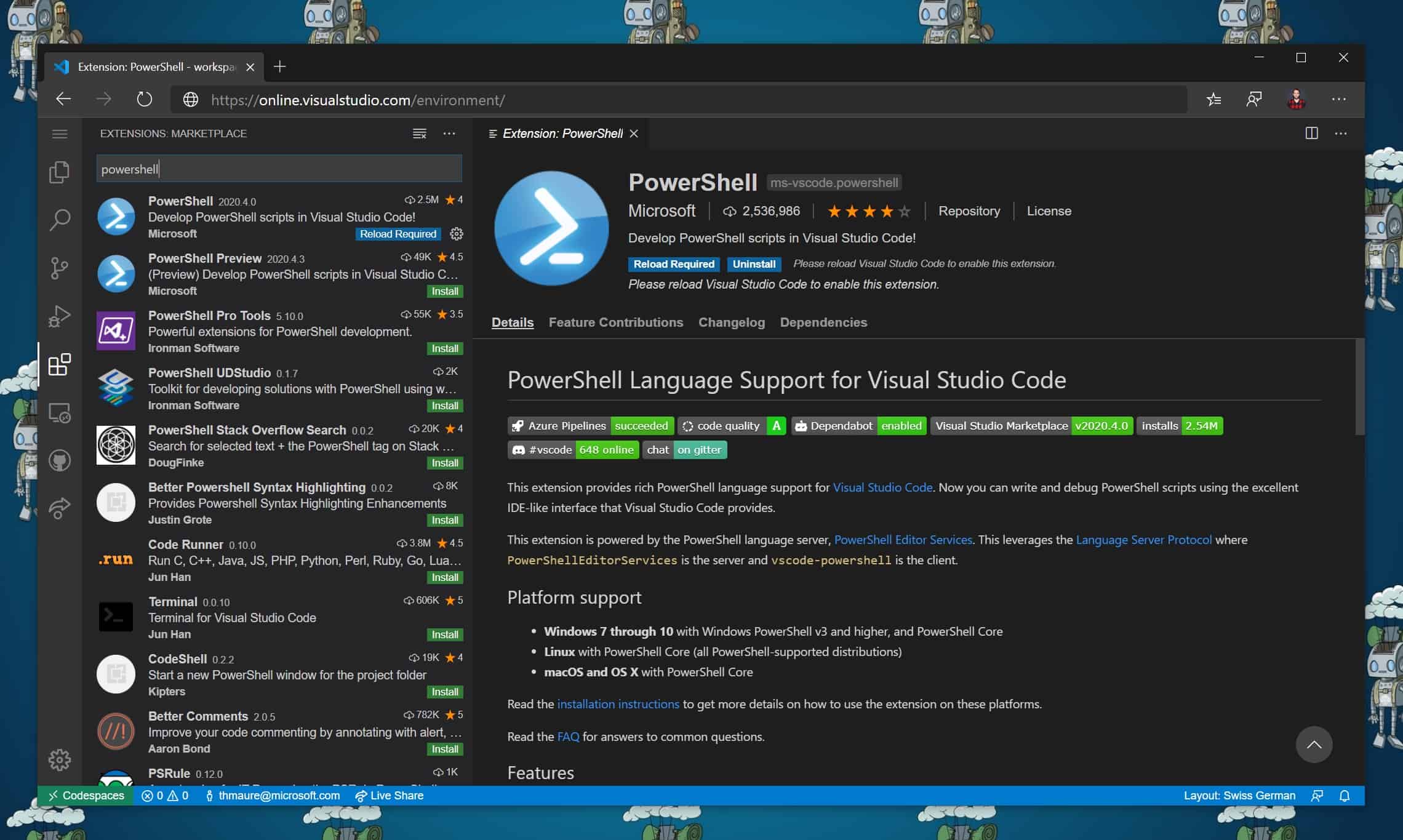Run code in Atom!
- Online Python3 Compiler, Online Python3 Editor, Online Python3 IDE, Python3 Coding Online, Practice Python3 Online, Execute Python3 Online, Compile Python3 Online, Run Python3 Online, Online Python3 Interpreter, Execute Python-3 Online (Python v3.6.2).
- Answer (1 of 6): Get a Raspberry Pi and run it on that. A Raspberry Pi is a 5 watt system and plenty powerful to run your python scripts. It’s also super cheap. For about $50 you can get the board, a crappy case, some heat sinks to boost performance (it throttles itself according to temperature —.
Running Python Scripts from the Command Line › See more all of the best online courses on www.humboldt.edu Courses. Posted: (1 week ago) Running Python Scripts from the Command Line. You've seen how to run Python scripts from inside Wing and inside ArcGIS.When you are processing large numbers of files in a 'batch' mode, you'll probably want to run them from the. Feb 07, 2013 Online Python Compiler, Online Python Editor, Online Python IDE, Python Coding Online, Practice Python Online, Execute Python Online, Compile Python Online, Run Python Online, Online Python Interpreter, Execute Python Online (Python v2.7.13). Your existing Python scripts run on CoCalc. Either open a Terminal in the code editor, or click the 'Shell' button to open a Python command line. Terminals also give you access to git and many more utilities. Regarding collaboration, terminals can be used by multiple users at once.This means you can work with your coworkers in the same session at the same time.
Run scripts based on file name, a selection of code, or by line number.
Currently supported grammars are:
| Grammar | File Based | Selection Based | Required Package | Required in PATH | Notes |
|---|---|---|---|---|---|
| Assembly (NASM) | Yes | Yes | language-x86-64-assembly | nasm, binutils | |
| 1C (BSL) | Yes | language-1c-bsl | oscript | ||
| Ansible | Yes | language-ansible | ansible-playbook | ||
| AutoHotKey | Yes | Yes | language-autohotkey | AutoHotKey.exe | |
| AppleScript | Yes | Yes | language-applescript | osascript | |
| BabelES6 JS | Yes | Yes | language-babel | node | |
| Bash | Yes | Yes | Runs if your SHELL or #! line is bash. | ||
| Bats (Bash Automated Test System) | Yes | Yes | language-bats | bats | |
Windows Batch (cmd.exe) | Yes | language-batch/file | |||
| Behat | Yes | behat-atom | behat | ||
| BuckleScript | Yes | Yes | bs-platform | bsc | |
| C | Yes | Yes | xcrun clang/cc | Available only on macOS and Linux. | |
| C# | Yes | Yes | csc.exe | ||
| C# Script | Yes | Yes | scriptcs | ||
| C++ | Yes | Yes | xcrun clang++/g++ | Available only on macOS and Linux. Run with -std=c++14. | |
| Clojure | Yes | Yes | lein exec | Requires Leiningen with the lein-exec plugin. | |
| CoffeeScript (Literate) | Yes | Yes | coffee | ||
| Crystal | Yes | Yes | language-crystal-actual | crystal | |
| Cucumber (Gherkin) | Yes | language-gherkin | cucumber | ||
| D | Yes | Yes | language-d | rdmd | |
| Dart | Yes | Yes | dartlang | dart | |
| DOT (Graphviz) | Yes | Yes | language-dot | dot | |
| Elixir | Yes | Yes | language-elixir | elixir | |
| Erlang | Yes | language-erlang | erl | Limited selection based runs only (see #70). | |
| F* | Yes | atom-fstar | fstar | ||
| F# | Yes | language-fsharp | fsharpi/fsi.exe | ||
| Fish | Yes | Yes | language-fish-shell | fish | |
| Forth | Yes | language-forth | gforth | ||
| Fortran | Yes | language-fortran | gfortran | ||
| Gnuplot | Yes | language-gnuplot-atom | gnuplot | ||
| Go | Yes | go | |||
| Groovy | Yes | Yes | language-groovy | groovy | |
| Haskell (Literate) | Yes | Yes | language-haskell | runhaskell/ghc | |
| HTML | Yes | Opens the current HTML file in your default browser. | |||
| Hy | Yes | Yes | language-hy | hy.exe | |
| IcedCoffeeScript | Yes | Yes | language-iced-coffee-script | iced | |
| Inno Setup | Yes | language-innosetup | ISCC.exe | ||
| Idris | Yes | language-idris | idris | ||
| io | Yes | Yes | atom-language-io | io | |
| Java | Yes | *jdk1.x.x_xxbin | Project directory should be the source directory; subfolders imply packaging. | ||
| Javascript | Yes | Yes | node | ||
| JavaScript for Automation (JXA) | Yes | Yes | language-javascript-jxa | osascript -l JavaScript | Available on macOS only. |
| Jolie | Yes | language-jolie | jolie | ||
| Julia | Yes | Yes | language-julia | julia | |
| Kotlin | Yes | Yes | language-kotlin | kotlinc | |
| LAMMPS | Yes | language-lammps | lammps | Available only on macOS and Linux. | |
| LaTeX | Yes | language-latex | latexmk | ||
| LilyPond | Yes | atlilypond | lilypond | ||
| Lisp | Yes | Yes | language-lisp | sbcl | Selection based runs are limited to a single line. |
| LiveScript | Yes | Yes | language-livescript | lsc | |
| Lua | Yes | Yes | language-lua[-wow] | lua | |
| Makefile | Yes | Yes | |||
| MATLAB | Yes | Yes | language-matlab | matlab | |
| MIPS | Yes | language-mips | spim | ||
| MongoDB | Yes | Yes | language-mongodb | mongo | |
| MoonScript | Yes | Yes | language-moonscript | moon | |
| NCL | Yes | Yes | language-ncl | ncl | Scripts must end with an exit command for file based runs. |
| newLISP | Yes | Yes | language-newlisp | newlisp | |
| Nim[Script] | Yes | language-nim | nim | ||
| NSIS | Yes | Yes | language-nsis | makensis | |
| Objective-C[++] | Yes | xcrun clang[++] | Available on macOS only. | ||
| OCaml | Yes | language-ocaml | ocaml | ||
| Octave | Yes | Yes | language-matlab | octave | |
| Oz | Yes | Yes | language-oz | ozc | |
| Pandoc Markdown | Yes | language-pfm | panzer | ||
| Pascal | Yes | Yes | language-pascal | fpc | |
| Perl | Yes | Yes | |||
| PHP | Yes | Yes | |||
| PostgreSQL | Yes | Yes | language-pgsql | psql | Connects as user PGUSER to database PGDATABASE. Both default to your operating system's USERNAME, but can be set in the process environment or in Atom's init file: process.env.PGUSER = {user name} and process.env.PGDATABASE = {database name} |
| POV-Ray | Yes | atom-language-povray | povengine/povray | ||
| PowerShell | Yes | Yes | language-powershell | powershell | |
| Processing | Yes | processing-language | processing-java | ||
| Prolog | Yes | language-prolog | swipl | Scripts must contain a rule with the head main (e.g.main:- parent(X,lucas),writeln(X).). The script is executed with the goal main and exits after the first result is found. The output is produced by the writeln/1 predicates. | |
| PureScript | Yes | language-purescript | pulp | ||
| Python | Yes | Yes | |||
| R | Yes | Yes | language-r | Rscript | |
| Racket | Yes | Yes | language-racket | racket | |
| Raku | Yes | Yes | raku | ||
| Reason | Yes | Yes | language-reason | rebuild | |
| Ren'Py | Yes | No | language-renpy | renpy | Runs your project at the root of the current file. |
| Robot Framework | Yes | No | language-robot-framework | robot | The output location depends on the CWD behaviour which can be altered in settings. |
| RSpec | Yes | Yes | language-rspec | rspec | |
| Ruby | Yes | Yes | |||
| Ruby on Rails | Yes | Yes | |||
| Rust | Yes | language-rust | rustc | ||
| Sage | Yes | Yes | language-sage | sage | |
| Sass/SCSS | Yes | sass | |||
| Scala | Yes | Yes | language-scala | scala | |
| Scheme | Yes | Yes | langauge-scheme | guile | |
| Shell Script | Yes | Yes | SHELL | Runs according to your default SHELL, or #! line. | |
| Standard ML | Yes | language-sml | sml | ||
| Stata | Yes | Yes | language-stata | stata | |
| Swift | Yes | language-swift | swift | ||
| Tcl | Yes | Yes | language-tcltk | tclsh | |
| TypeScript | Yes | Yes | ts-node | ||
| VBScript | Yes | Yes | language-vbscript | cscript | |
| Zsh | Yes | Yes | Runs if your SHELL or #! line is zsh. |
NOTE: Some grammars may require you to install a custom language package.
You only have to add a few lines in a PR to support another.
Installation
apm install script
or
Search for script within package search in the Settings View.
Atom can't find node | ruby | python | my socks
Make sure to launch Atom from the console/terminal. This gives atom all your useful environment variables. Additionally, make sure to run it with the project path you need. For example, use
to get it to run with the current directory as the default place to run scripts from.
If you really wish to open atom from a launcher/icon, see this issue for a variety of workarounds that have been suggested.
Usage
Make sure to run atom from the command line to get full access to your environment variables. Running Atom from the icon will launch using launchctl's environment.
Script: Run will perform a 'File Based' run when no text is selected (default).

Script: Run while text is selected will perform a 'Selection Based' run executing just the highlighted code.
Script: Run by Line Number to run using the specified line number. Note that if you select an entire line this number could be off by one due to the way Atom detects numbers while text is selected.
Script: Configure Script should be used to configure command options, program arguments, and environment variables overrides. Environment variables may be input into the options view in the form VARIABLE_NAME_ONE=value;VARIABLE_NAME_TWO='other value';VARIABLE_NAME_3='test'.
Also, in this dialog you can save options as a profile for future use. For example, you can add two profiles, one for python2.7 and another for python3 Super writemaster speed plus driver. and run scripts with a specified profile, which will be more convinient than entering options every time you want to switch python versions.
Change Default Language by opening Atom Settings as follows: Atom→Preferences→Open Config Folder. Then, you can use the tree-view to navigate to and open packages→script→lib→grammar→python.js to make your edits. It is also possible to directly edit the code under .atom/packages/script/lib/grammars/python.js
Script: Run With Profile allows you to run scripts with saved profiles. Profiles can be added in Script: Run Options dialog.
Script: Kill Process will kill the process but leaves the pane open.
Script: Close View closes the pane and kills the process.
To kill everything, click the close icon in the upper right and just go back tocoding.
Script: Copy Run Results copies everything written to the output pane to theclipboard, allowing you to paste it into the editor.
Command and shortcut reference
| Command | macOS | Linux/Windows | Notes |
|---|---|---|---|
| Script: Run | cmd-i | shift-ctrl-b | If text is selected a 'Selection Based' is used instead of a 'File Based' run |
| Script: Run by Line Number | shift-cmd-j | shift-ctrl-j | If text is selected the line number will be the last |
| Script: Run Options | shift-cmd-i | shift-ctrl-alt-o | Runs the selection or whole file with the given options |
| Script: Run with profile | shift-cmd-k | shift-ctrl-alt-b | Runs the selection or whole file with the specified profile |
| Script: Close View | esc or ctrl-w | esc | Closes the script view window |
| Script: Kill Process | ctrl-c | ctrl-q | Kills the current script process |
Replacements
The following parameters will be replaced in any entry in args (command and program arguments). They should all be enclosed in curly brackets {}
{FILE_ACTIVE}- Full path to the currently active file in Atom. E.g./home/rgbkrk/atom-script/lib/script.coffee{FILE_ACTIVE_PATH}- Full path to the folder where the currently active file is. E.g./home/rgbkrk/atom-script/lib{FILE_ACTIVE_NAME}- Full name and extension of active file. E.g.,script.coffee{FILE_ACTIVE_NAME_BASE}- Name of active file WITHOUT extension. E.g.,script{PROJECT_PATH}- Full path to the root of the project. This is normally the path Atom has as root. E.g/home/rgbkrk/atom-script
Parameters are compatible with atom-build package.
Development
This is an Open Open Source Project, which means:
Individuals making significant and valuable contributions are given commit-access to the project to contribute as they see fit.
As for coding and contributing, rely on the atom contributing guidelines.They're pretty solid.
Quick and dirty setup
apm develop script
This will clone the script repository to ~/github unless you set theATOM_REPOS_HOME environment variable.
I already cloned it!
If you cloned it somewhere else, you'll want to use apm link --dev within thepackage directory, followed by apm install to get dependencies.
Workflow

After pulling upstream changes, make sure to run apm update.
To start hacking, make sure to run atom --dev from the package directory.Cut a branch while you're working then either submit a Pull Request when doneor when you want some feedback!
If you’ve had a look on previous posts on our Python SDK, you have a already a pretty good idea about scripts you can run against PMA.start (or PMA.core) for retrieving image data, Slide visualization…
Most of the times running code locally is all what’s needed, however there are situations where being able to run it online and share it with collaborators (students, colleagues…) on the other side of the globe can come very handy and offer a richer and more interactive experience.
There are couple of free/paid services to run & share Python code online, our focus in this tutorial will be on Azure notebooks powered by Jupyter.
As stated on the official documentation, Azure Notebooks is a free service for anyone to develop and run code in their browser using Jupyter. Jupyter is an open source project that enables combing markdown prose, executable code, and graphics onto a single canvas.

Azure Notebooks currently supports Python 2, Python 3, R and F# and their popular packages (e.g for Python the Anaconda distro is preinstalled), but our focus for the moment will be on Python 3 since it’s the minimum required version for the Python SDK
To create your first Azure notebooks project, navigate to the home page
click on Try it now then login (any Microsoft, Gmail,…. email address).
Once successfully logged in, navigate to section My Projects
Click on button New Project :
Introduce a Project name and and ID then click on Create (It’s worth mentioning that you have to set the project as Public if you wish to be able to share your notebooks with other users)
Click on the newly created project :
Notebooks are organized by projects, this makes it very efficient to create separate projects depending on scripts, target hosts and target audience to share notebooks with.
To create a new notebook, click on menu + then select Notebook. Add a name for the notebook and select your Python 3 version (either 3.5 or 3.6 as both compatible with the Python SDK)
Python Script Runner Online Game
Notebooks are organized into cells, each cell can contain one or multiple python scripts to execute.
Ocam for mac. First cell should always be the following one as it’s required to install first pma_python packages on the running server before being able to interact with the Python SDK.
From there on you can add as many cells as you wish to interact with the Python SDK via scripts we introduced on previous posts or ones you create yourself.
Python Script Runner Online
Once your notebook modified and saved, you can easily share the created project with other users via share button on My projects page.
In addition to its intuitive and easy-to-use interface, Azure notebooks do provide provides access to a complete terminal running on the server. To access the terminal first click on the Jupyter icon in the upper left hand corner of your notebook server. Then click on the New button on the upper right hand side of the notebook list. Finally click Terminal.
Python Script Runner online, free
Your newly created notebook is accessible on the running server and executing shell commands there which can be useful for downloading data, copying files, inspecting processes, or editing files with traditional Unix tools.